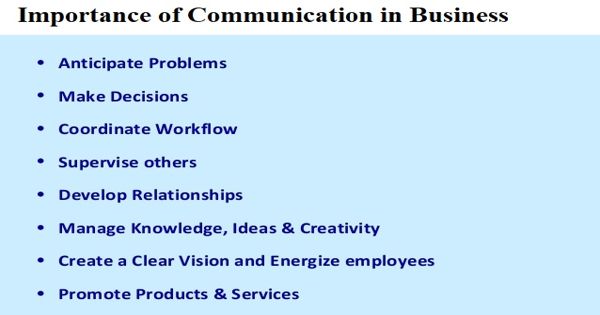Everything you need to know about the Importance of communication in a business organization. Barnard said, “Communication is the central point to operate all business activities and all managerial activities which are communication-centric.“ The importance of the concept of communication in management cannot be overemphasized. One reason communication is so important is that it can make or break the way that something gets done within the company. It is an established fact that one of the foundation stones upon which an organization rests is a system of communication.
Importance of Communication in Business
Such a definition signifies the use of communication in business. Some of those are as follows.

- Achievement of goals:
Every organization works to achieve its own goal. To do such, the first-and prime objective of communication is to establish the link between management and employees so that predetermined goals may be achieved through their combined effect.
- Exchange of information:
In order to define and explain the predetermined goal of an organization, there must be an exchange of information from top to bottom of the organization, to accomplish the goal; both internal and external communication is required.
- Enhancement of employee Skill:
Human resources may be skilled, semi-skilled or unskilled. Skilled and efficient human resources are considered to be the assets of an enterprise. To transform human resources from unskilled to semi-skilled and from semi-skilled to skilled it requires training. Such training is implemented through effective communication.
- Boost customer relationships
Your business won’t succeed without customers and communicating with them effectively is also one of the essential ways to create customer loyalty in business. Whether you sell or deliver products and services, you have to listen and understand the needs of your customers and provide them with excellent customer service by answering their questions.
- Formulation and execution of plan:
In this age of competition, every organization formulates its plan in such a way, so that it can edge over competitors in terms of price, quality & service. So, the development and thereafter execution of plans involve extensive communication.
- Direction to the subordinates:
For better job performance, subordinates require specific instructions and orders from their respective bosses. Communication is the link that creates a network between boss and subordinate to share the message and make proper feedback.
- Facilitating joint effort:
Management alone is helpless to achieve its goal. It requires the co-operation of all employees for the purpose. Communication flows to create joint initiatives of management and the employees.
- Motivating employees:
Motivation acts as an energizer. It makes and keeps employees active. Motivation must-be situational i.e. persons at different levels require different types of motivation. Such motivation is accomplished through communication.
- Increasing job satisfaction:
If an employee is not satisfied then it affects his performance. So, causes of dissatisfaction are to be identified and steps are to be taken to solve the problems through financial or non-financial incentives. In all cases, communication is needed.
- Maintaining effective labor relations:
Good management-labor relation is a prerequisite for achieving target results. Any sort of confusion or misunderstanding may hamper the joint effort. Close relations should be developed between employers and employees. Such a situation is created when both interact or communicate formally or informally.
- Maintaining co-operation and coordination:
An Organization consists of various departments that need co-ordination because the activities of one department are dependent on another department. While all officers and employees need mutual cooperation for proper functioning, Communication facilitates such purpose.
- Investigation & marketing research:
In this competitive age, every business wants to satisfy its customers and consumers. So, a business makes research regarding taste, choice & demand of buyers as well as the impression of the market and without any communication, investigation and marketing research is impossible.
- Advertisement and Circulation:
Due to the advancement of technology, any piece of public information can be circulated within a second. Every Organization is trying heart and soul to create and expand its market by defeating its competitors. Communication aids an Organization to advertise and circulate its product and service towards the mass people and therefore helpful for market creation.
- Connection with stakeholders:
Shareholders, creditors, suppliers, regulatory bodies, and the government are interested parties called stakeholders. They have different interests towards a business such as shareholders want regular payment of dividends at a better rate, creditors want better servicing of their extended credit, regulatory bodies want compliance to various rules & regulation of the state’ etc. Each and every interest of the stakeholders has fulfilled the interims of active communication.
Information Source:
















